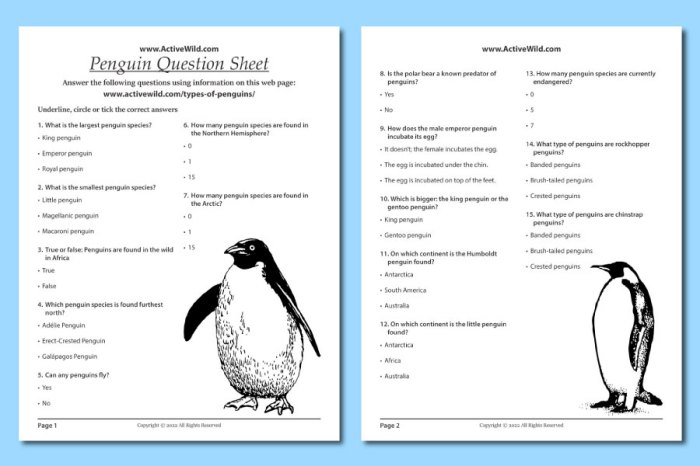March of the penguins worksheet answers – The “March of the Penguins” worksheet answers provide an in-depth exploration of the captivating documentary film that has captivated audiences worldwide. This worksheet serves as an invaluable tool for educators, students, and film enthusiasts alike, offering a structured approach to understanding the film’s profound themes and educational value.
Delving into the worksheet’s content, we uncover key concepts and topics that illuminate the documentary’s narrative. These elements play a pivotal role in fostering critical thinking and problem-solving skills, while simultaneously promoting environmental awareness and conservation.
March of the Penguins Worksheet: Educational Resource for Understanding the Film
The “March of the Penguins” worksheet serves as a valuable educational tool to enhance students’ comprehension and critical analysis of the acclaimed documentary film “March of the Penguins.” This worksheet delves into the film’s central themes, fosters critical thinking, and promotes environmental awareness.
Worksheet Content Analysis: March Of The Penguins Worksheet Answers
The worksheet encompasses a comprehensive range of concepts and topics, including:
- The Emperor penguin’s unique reproductive cycle
- The perilous journey to the breeding grounds
- The challenges and sacrifices faced by the penguins
- The importance of cooperation and teamwork
- The impact of environmental factors on penguin survival
These concepts are crucial for students to grasp the film’s message about the resilience, determination, and interconnectedness of life in the Antarctic ecosystem.
The worksheet employs various question types and activities, such as:
- Comprehension questions to assess students’ understanding of key events
- Analysis questions to encourage critical thinking and interpretation
- Discussion questions to facilitate classroom discussions
- Creative activities, such as writing assignments or drawing tasks, to enhance engagement and foster a deeper understanding of the film’s themes.
Educational Value
The “March of the Penguins” worksheet enhances students’ understanding of the film’s themes and messages in several ways:
- It provides a structured framework for students to process and analyze the film’s content.
- It promotes critical thinking and problem-solving skills by encouraging students to engage with the film’s complex ideas.
- It raises awareness about environmental issues and the importance of conservation.
Classroom Applications

The worksheet can be effectively incorporated into lessons in various ways:
- As a pre-viewing activity to introduce the film’s themes and concepts
- As an in-class activity to facilitate comprehension and discussion
- As a post-viewing activity to reinforce learning and assess understanding
It is suitable for different grade levels and subject areas, including science, biology, environmental studies, and language arts.
The worksheet can serve as a springboard for further research and discussion on topics such as animal behavior, climate change, and the fragility of ecosystems.
Worksheet Design
The worksheet is designed with a clear and logical layout.
- The visuals, fonts, and spacing are effective in enhancing readability and engagement.
- The questions and activities are organized in a sequential manner, guiding students through the film’s key themes and concepts.
Suggestions for improvements include:
- Incorporating more interactive elements, such as online simulations or videos
- Providing more scaffolding for students who may struggle with certain concepts
Clarifying Questions
What is the primary purpose of the “March of the Penguins” worksheet?
The worksheet aims to enhance understanding of the documentary’s themes, foster critical thinking and problem-solving skills, and promote environmental awareness.
How can teachers effectively incorporate the worksheet into their lessons?
Teachers can integrate the worksheet into various subject areas and grade levels, using it as a springboard for discussions, research projects, and creative writing assignments.
What types of questions are included in the worksheet?
The worksheet features a range of questions, including comprehension questions, analysis questions, and reflection questions, designed to assess students’ understanding and engagement with the film.